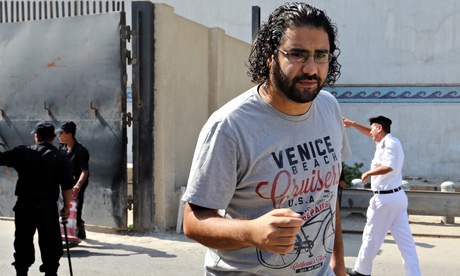Justice in the civilian system
When 683 people were given death sentences this year for their alleged role in the police attacks, many saw it is an appropriate deterrent to further violence, but others saw evidence of an unaccountable security state and rotten judicial system.
The death sentences were the latest in a series of draconian court decisions, including students being given 17-year jail-terms for demonstrating on campus and protesters handed life sentences for blocking roads while policemen walk free for murder.
Three leftist activists – Mahienour el-Masry, Ahmed Maher and Alaa Abd El Fatah – who helped organise the protests that led to the fall of Mubarak – were jailed three years later under a new law that allows the government to stop its opponents mobilising in public.

But many detainees remain uncharged after months in jail, with judges renewing their detentions en masse every 45 days – a situation that rights campaigners say amounts to arbitrary detention.
“Every detainee should be able to access a judge who can assess the validity of their detention,” said Mohamed Lotfy, the director of the Egyptian Commission for Rights and Freedoms, which has also investigated Azouli. “But that’s not happening. They don’t have an effective means of challenging the legality of their detention and to me that’s a denial of fundamental rights.”
Even once a trial does begin, due process is by no means guaranteed. The absurdities of the trial of three al-Jazeera English journalists – in which prosecutors have presented footage of trotting horses and a BBC documentary from Somalia as evidence – shows how flawed Egypt’s court system can be.
Read more